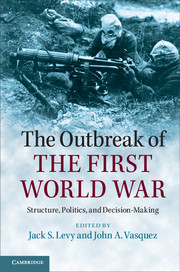Book contents
- Frontmatter
- Dedication
- Contents
- List of figures
- List of tables
- List of contributors
- Preface
- Part I Overview of debates about the causes of the First World War
- Part II Structure and agency
- Part III The question of preventive war
- Part IV The role of the other powers
- 9 War accepted but unsought
- 10 France’s unreadiness for war in 1914 and its implications for French decision-making in the July Crisis
- References
- Index
- References
10 - France’s unreadiness for war in 1914 and its implications for French decision-making in the July Crisis
Published online by Cambridge University Press: 05 July 2014
- Frontmatter
- Dedication
- Contents
- List of figures
- List of tables
- List of contributors
- Preface
- Part I Overview of debates about the causes of the First World War
- Part II Structure and agency
- Part III The question of preventive war
- Part IV The role of the other powers
- 9 War accepted but unsought
- 10 France’s unreadiness for war in 1914 and its implications for French decision-making in the July Crisis
- References
- Index
- References
Summary
The French specialist in international history, Jean-Baptiste Duroselle, asked whether political leaders caught up in the complexities of a process that in the end leads to war have a clear view of what they are seeking to achieve: maybe the avoidance of war; maybe the most propitious circumstances for war? Do they continually calculate or measure the impact of each decision on the possible outbreak of conflict, as historians do with the benefit of hindsight? Similarly, do decision-makers have in their minds a running calculus of their state’s readiness for war – a risk analysis? If so, do they act upon it at every turn? In short, do they act rationally with each decision in what might be called the fog of pre-war? Whatever the degree of calculation per decision, it is reasonable to assume, however, that leaders apply a minimum of rationality in their decision-making when success or failure in conflict is at stake.
Well before its end the First World War raised the question of state responsibility for its outbreak. But behind the charge of intentional provocation lies the assumption that before they act decision-makers engage in a minimum of strategic analysis, “that leaders’ decisions for war are generally based on some kind of cost–benefit calculation of the consequences of war.” Leaders might be assumed to attach different probabilities to different choices and outcomes. In modern parlance, they engage in a risk assessment of the consequences of war, identifying, assessing, and prioritizing the risks to the national interests that encouraging war might bring. Rationality suggests that leaders seek to encourage war only if it is in the national interest to do so. A key component in the risk assessment must be whether a state is strong and ready for war.
- Type
- Chapter
- Information
- The Outbreak of the First World WarStructure, Politics, and Decision-Making, pp. 252 - 272Publisher: Cambridge University PressPrint publication year: 2014
References
- 1
- Cited by



